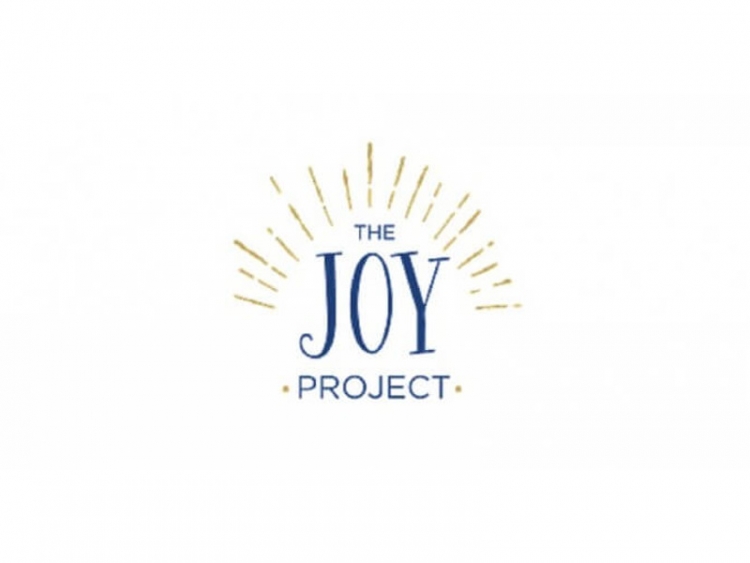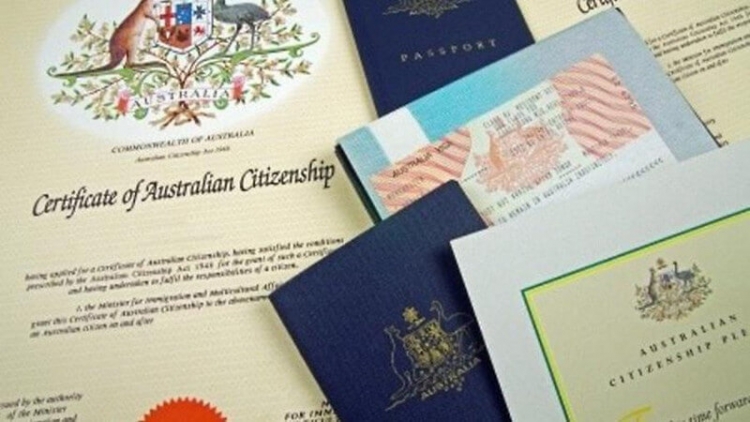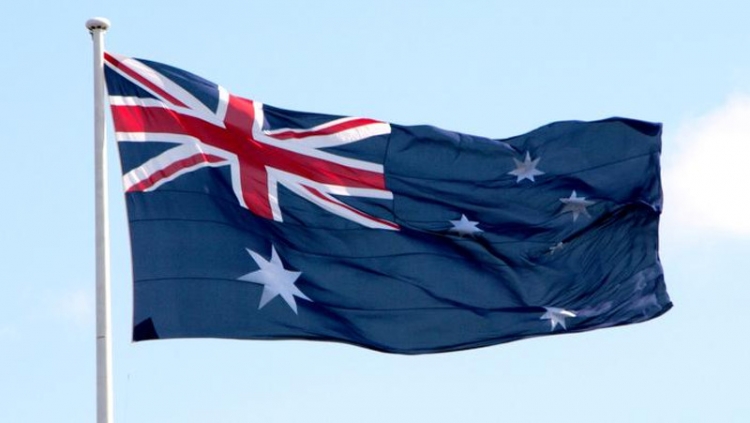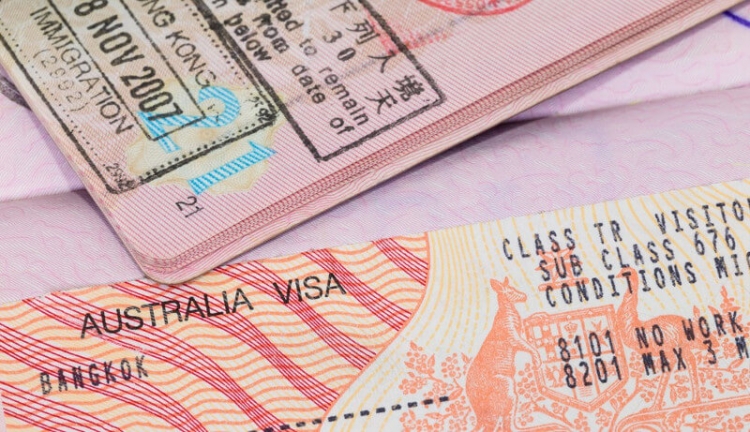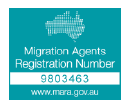Apply now: General Skilled Migration Assessment

raramuridesign support
Emigrate to Australia - Block 03
I am internationally recognized in my field as a Global Talent.
Emigrate to Australia - Block 01
I am a professional with a tertiary qualification or Trade and no job offer.
Financial emigration to Australia - what you need to know
You wake up to an email from the Department of Immigration with your Australian visa grant. All the hard work has paid off - and you’re finally cleared for emigration. But what about your money?
After your visa is granted, top of the admin list is generally to start liquidating your assets – and to decide on when and how to transfer your wealth offshore.
You can open an Aussie Bank account
Much like South Africa, there are four big retail banks in Australia. These are the Commonwealth Bank of Australia (CBA); Westpac Banking Corporation (Westpac); Australia and New Zealand Banking Group (ANZ); and National Australia Bank (NAB).
Each of these banks offers what is known as a migrant banking account to South Africans that are moving to Australia – and you can open one online. When you arrive in Australia, you can go into your nominated branch to activate your account and pick up your bank cards.
You can transfer funds to Australia before you leave
Exchange control regulations govern the amount you can transfer to Australia, and there are a number of exchange control allowances you can use for this purpose.
The two allowances that are most relevant to South African migrants (and ex-pats) are the Single Discretionary Allowance and the Foreign Investment Allowance.
The Single Discretionary Allowance permits individuals over 18 years of age to transfer up to R1m per calendar year. The Foreign Investment Allowance permits taxpayers that are in good standing to transfer a further R10m per calendar year and requires clearance from SARS.
You don’t have to use your bank
You can choose to transfer funds to Australia through your bank, or you can use a financial services / money service business – like MyGlobalCFO.
These businesses provide a value-added service to help you transfer funds efficiently, without having to go into a branch. They can provide expert advice on how to utilise your allowances, and some are able to offer better AUD rates than commercial banks.
If you plan to use one, make sure they are a Registered South African Financial Services Provider (you can check on the Financial Services Board website).
Beware the “free” transfer
At the moment, there are no charities which offer FX transfer services. Unfortunately, what this means is that there is no such thing as a free transfer.
Many FX transfer businesses advertise these, so before moving funds – make sure you are comfortable with how they make their money, and more importantly that your transfer is secure.
What is formal financial emigration?
Financial emigration is the process of changing your exchange control / banking status from resident to non-resident.
You may consider yourself to have emigrated permanently, but if you haven’t notified SARS and the South African Reserve Bank – you are still considered a ‘South African temporarily abroad’ from their perspective.
Financial emigration may become relevant if you still have a retirement annuity in South Africa. You might want to redeem it to incorporate the proceeds into your Super fund and/or protect against Rand depreciation, but your Assurer may not release your funds unless you financially emigrate.
Who is MyGlobalCFO and how can they help?
MyGlobalCFO assists South African clients with the transfer of their wealth offshore (Services include FX Transfer, Financial Emigration, and Offshore Investment Management).
You’ll deal with a foreign exchange and investment professional from day one, who will get your funds to Australia securely, keep you exchange control compliant, and execute your transfers at highly competitive AUD rates.
Source: thesouthafrican.com
If you are Brisbane bound, read this
If you are heading to Brisbane soon, or you know someone who is, make The Joy Project your first port of call. The Joy Project offer relocation support and advice for anyone moving to Brisbane.
For anyone who has relocated to or is thinking of moving to Brisbane, this is for you.
The Joy Project is a service providing practical information and personal connection, served with a side order of joy, to new arrivals. They aim to make the transition as smooth and easy as possible. They offer support as you navigate relocation, as you settle in, and they bring you some JOY at the same time.
Their mission is to provide friendship and support to people who move to Brisbane, and it’s a mission they take very seriously. So seriously in fact that they meet for coffee once a fortnight and hug anyone brave enough to join them.
They welcome newcomers to the beautiful River City in two ways. The first is by providing practical information to help you find your way around. They have compiled information on anything from schools, medical centers, shopping centers and hairdressers in your area. Anything they don’t know, they will help you find out.
The second service The Joy Project offers is an invitation to social functions where you are presented with the opportunity for friendships and support for spouses and families of people who have relocated to Brisbane.
Joy meet regularly for social events, offering a chance to relax and meet new friends. It’s free of charge apart from anything those who attend choose to buy to eat or drink.
The Joy Project is a truly remarkable initiative. It started in 2014 as an idea the size of a mustard seed when three friends were discussing how difficult it must be to settle in a new place.
Their own friendship is filled with laughter and the simple joy of companionship. The thought of a life without the gift that their friendship brings to each of them makes them sad. And it’s that loneliness they want to help newcomers avoid.
And so they took a leap of faith and decided they had enough joy to share with newcomers to Brisbane.
As with all seeds under just the right conditions, the idea grew into a beautiful living thing: The Joy Project
The Joy Project has a website on which you can find local information on just about anything. From hairdressers to doctors; from hospitals to massage therapists; white goods repair shops, recipes, and my personal favourite: How to do Ikea the easy way.
Whatever info you’re after, the girls at The Joy Project can help you find it. If it’s not already on their website they take questions and requests, and will find out whatever it is you want you know, if it is appropriate and of interest to other Joy Project-ers.
Every two weeks the girls host a coffee morning to which everyone’s invited. They advertise the coffee mornings on their website and on their Facebook page and they turn up on the morning, trusting that whoever needs a welcome and a hug will find their way there. And there hasn’t been a single event to which at least one person hasn’t turned up.
So if you are heading to Brisbane soon, or you know someone who is, make The Joy Project your first port of call. If you’ve been in Brisbane a little while and are struggling to find your feet, consider attending one of The Joy Project’s next coffee mornings. You won’t be sorry you did.
Source: thesouthafrican.com
Get your retirement savings out of SA now
You may have heard that South Africans who have emigrated or relocated, may not have financially emigrated (this process is also called formal emigration). This week we will look at why, if you have settled abroad or are planning to do so, you should financially emigrate as soon as you can.
When you financially emigrate, you are viewed as a non-resident by the South African Reserve Bank (SARB) and South African Revenue Service (SARS). One compelling reason for financial emigration is that it allows you to withdraw your retirement savings (before you turn 55) and transfer the after tax capital offshore as soon as the process is completed. You will then be able to reinvest or spend those funds in the country to which you’ve relocated.
Let’s take a look at why it is important for you to consider getting your retirement savings out of South Africa sooner rather than later:
1. You can withdraw your funds without the early withdrawal product penalties.
The withdrawal process means that you can access your retirement annuity capital, less the retirement fund withdrawals tax liability. There are no hidden penalties as is usually the case with early withdrawals.
2. Having access to these funds allows you to add to existing retirement funds
The sooner you withdraw your retirement annuities, the sooner you can add the funds to your existing retirement plan overseas. This is a popular choice for many of our clients. Take note, all money transferred out of South Africa will incur taxation. Upon receipt of your after tax proceeds in South Africa, the funds become discretionary after-tax in the hands of the individual.
3. Hedge against the South African Rand
If you, like many people who emigrate, intend on moving back to South Africa when you retire, you probably intend to draw on your offshore savings in retirement. The sooner you move your capital into a more stable economy, the more likely it is that you will benefit later in life. The benefits of retiring in South Africa and living off a Pound or Dollar retirement plan are immense.
4. It’s better to have your retirement savings in the country were you reside
Before retirement, it would usually be advantageous to structure your retirement savings in the country in which you live. This allows you to administer them efficiently and creates a natural inflation hedge within that jurisdiction, where there is no mismatch between asset and liability. This is vital for proper cash flow management in retirement.
5. It allows better matching of asset to liability in the same currency and market
If you plan on living overseas in your retirement, you probably want your retirement savings in the currency of your adopted home. It can be very difficult to live in the UK and live off of a Rand denominated retirement plan.
6. The sooner you withdraw, the sooner you will have more financial freedom
You can do anything you want with your funds once you have withdrawn them. Pay off your bond, fund your child’s education or even use those funds as start-up capital for a new business venture. By withdrawing your retirement annuities you gain more financial freedom; the sooner you do this, the better.
Source: thesouthafrican.com
Latest Invitation Round
The table below shows the number of invitations issued in the Skill Select invitation round on 18 January 2017.
Invitations issued on 18 January 2017
| Visa Subclass | Number |
|---|---|
| Skilled - Independent (subclass 189) | 1061 |
| Skilled - Regional Provisional (subclass 489) | 31 |
During 2016-17 the following numbers of invitations have been issued
Invitations issued during 2016-17
| Visa subclass | Jan | Feb | Mar | Apr | May | Jun | Jan | Feb | Mar | Apr | May | June | Total |
|---|---|---|---|---|---|---|---|---|---|---|---|---|---|
| Skilled - Independent (subclass 189) | 3050 | 2800 | 4200 | 2400 | 1861 | 2465 | 2016 | 0 | 0 | 0 | 0 | 0 | 18792 |
| Skilled – Regional Provisional (subclass 489) | 200 | 200 | 363 | 100 | 69 | 69 | 44 | 0 | 0 | 0 | 0 | 0 | 1045 |
| Total | 3250 | 3000 | 4563 | 2500 | 1930 | 2534 | 2060 | 0 | 0 | 0 | 0 | 19837 |
The above figures do not include invitations issued for State and Territory Government nominated visa subclasses. State and Territory Governments nominate throughout the month for specific points tested skilled migration and business innovation and investment visas. Separate results for these visa subclasses are provided monthly.
18 January 2017 results
The following graph shows the points for clients who were invited to apply in the 18 January 2017 round.

Invitation process and cut offs
The highest ranked clients by points score are invited to apply for the relevant visa. For clients who have equal points scores, the time at which they reached their points score for that subclass (referred to as the visa date of effect) determines their order of invitation. Expressions of Interest with earlier dates of effect are invited before later dates.
| Visa Subclass | Points score | Visa date of effect |
|---|---|---|
| Skilled - Independent (subclass 189) | 60 | 17/01/2017 7.00 am |
| Skilled - Regional Provisional (subclass 489) | 60 | 18/01/2017 12.04 am |
Due to high levels of demand, and in keeping with previous years, the below occupation groups will be subject to pro rata arrangements to ensure availability of invitations across the programme year. SkillSelect first allocates available places to Skilled – Independent visas (subclass 189) and then the remaining to Skilled – Regional (Provisional) visas (subclass 489). If all places are taken up by subclass 189 visas then there will be no invitations issued for subclass 489 visas in these occupations.
- Accountants
- Auditors, Company Secretaries and Corporate Treasurers
- Electronics Engineers
- Industrial, Mechanical and Production Engineers
- Other Engineering Professionals
- ICT Business and System Analysts
- Software and Applications Programmers
- Computer Network Professionals
Points scores and the visa dates of effect cut off for the below occupations in the 18 January 2016 invitation round.
| Occupation Identification | Description | Points score | Visa date of effect |
|---|---|---|---|
| 2211 | Accountants | 70 | 13/09/2016 12:03 am |
| 2212 | Auditors, Company Secretaries and Corporate Treasurers | 70 | 2/11/2016 1.51 pm |
| 2334 | Electronics Engineer | 60 | 28/10/2016 1.31 pm |
| 2335 | Industrial, Mechanical and Production Engineers | 65 | 1/11/2016 1.41 am |
| 2339 | Other Engineering Professionals | 65 | 24/11/2016 8.31 am |
| 2611 | ICT Business and System Analysts | 65 | 12/07/2016 2.28 pm |
| 2613 | Software and Applications Programmers | 65 | 10/12/2016 8.59 pm |
| 2631 | Computer Network Professionals | 65 | 26/11/2016 3.59 pm |
Occupation Ceilings
The table below shows the occupation ceilings for the 2016-2017 programme year for each occupation on the Skilled Occupation List (SOL) by four-digit ANZSCO code unit group, and the number of invitations that will be issued in this programme year.
Occupation ceiling values are based on a percentage of stock employment figures for each occupation. Stock employment figures are provided by the Australian Bureau of Statistics, and represent the number of people employed in Australia in each occupation.
The ceilings ensure the skilled migration programme is not dominated by a narrow group of occupations.
Occupation ceilings do not apply to State or Territory Nominated, Employer Sponsored or Business Innovation and Investment visa subclasses.
Occupation ceilings for the 2016-17 programme year
| Occupation ID | Description | Occupation Ceiling Value 2016-2017 | Invitations to date |
|---|---|---|---|
| 1331 | Construction Managers | 5289 | 77 |
| 1332 | Engineering Managers | 1407 | 19 |
| 1335 | Production Managers | 3368 | 8 |
| 1341 | Child Care Centre Managers | 1000 | 15 |
| 1342 | Health and Welfare Services Managers | 1177 | 27 |
| 2211 | Accountants* | 2500 | 1708 |
| 2212 | Auditors, Company Secretaries and Corporate Treasurers | 1413 | 935 |
| 2241 | Actuaries, Mathematicians and Statisticians | 1000 | 72 |
| 2245 | Land Economists and Valuers | 1035 | 33 |
| 2312 | Marine Transport Professionals | 1000 | 68 |
| 2321 | Architects and Landscape Architects | 1391 | 273 |
| 2322 | Cartographers and Surveyors | 1000 | 58 |
| 2331 | Chemical and Materials Engineers | 1000 | 450 |
| 2332 | Civil Engineering Professionals | 2174 | 1049 |
| 2333 | Electrical Engineers | 1254 | 563 |
| 2334 | Electronics Engineers | 1000 | 705 |
| 2335 | Industrial, Mechanical and Production Engineers | 1539 | 1365 |
| 2339 | Other Engineering Professionals | 1000 | 850 |
| 2341 | Agricultural and Forestry Scientists | 1000 | 134 |
| 2346 | Medical Laboratory Scientists | 1602 | 89 |
| 2347 | Veterinarians | 1000 | 68 |
| 2349 | Other Natural and Physical Science Professionals | 1000 | 15 |
| 2411 | Early Childhood (Pre-primary School) Teachers | 1822 | 126 |
| 2414 | Secondary School Teachers | 8032 | 351 |
| 2415 | Special Education Teachers | 1126 | 12 |
| 2512 | Medical Imaging Professionals | 1000 | 52 |
| 2514 | Optometrists and Orthoptists | 1000 | 5 |
| 2519 | Orthotist or Prosthetist | 1000 | 3 |
| 2521 | Chiropractors and Osteopaths | 1000 | 17 |
| 2524 | Occupational Therapists | 1000 | 86 |
| 2525 | Physiotherapists | 1345 | 103 |
| 2526 | Podiatrists | 1000 | 15 |
| 2527 | Speech Professionals and Audiologists | 1000 | 26 |
| 2531 | General Practitioners and Resident Medical officers | 3495 | 246 |
| 2532 | Anaesthetists | 1000 | 20 |
| 2533 | Internal Medicine Specialists | 1000 | 32 |
| 2534 | Psychiatrists | 1000 | 8 |
| 2535 | Surgeons | 1000 | 14 |
| 2539 | Other Medical Practitioners | 1315 | 370 |
| 2541 | Midwives | 1017 | 26 |
| 2544 | Registered Nurses | 16346 | 1849 |
| 2611 | ICT Business and Systems Analysts | 1482 | 1080 |
| 2613 | Software and Applications Programmers | 5662 | 3848 |
| 2631 | Computer Network Professionals | 1426 | 1182 |
| 2633 | Telecommunications Engineering Professionals | 1000 | 597 |
| 2711 | Barristers | 1000 | 1 |
| 2713 | Solicitors | 5154 | 130 |
| 2723 | Psychologists | 1532 | 55 |
| 2725 | Social Workers | 1783 | 120 |
| 3122 | Civil Engineering Draftspersons and Technicians | 1000 | 91 |
| 3123 | Electrical Engineering Draftspersons and Technicians | 1000 | 63 |
| 3132 | Telecommunications Technical Specialists | 1000 | 20 |
| 3211 | Automotive Electricians | 1000 | 7 |
| 3212 | Motor Mechanics | 5597 | 115 |
| 3222 | Sheetmetal Trades Workers | 1000 | 1 |
| 3223 | Structural Steel and Welding Trades Workers | 4466 | 41 |
| 3232 | Metal Fitters and Machinists | 6677 | 60 |
| 3233 | Precision Metal Trades Workers | 1000 | 0 |
| 3241 | Panelbeaters | 1000 | 5 |
| 3311 | Bricklayers and Stonemasons | 1751 | 22 |
| 3312 | Carpenters and Joiners | 7718 | 95 |
| 3322 | Painting Trades Workers | 2871 | 15 |
| 3331 | Glaziers | 1000 | 2 |
| 3332 | Plasterers | 2149 | 18 |
| 3334 | Wall and Floor Tilers | 1475 | 3 |
| 3341 | Plumbers | 5169 | 42 |
| 3411 | Electricians | 9345 | 124 |
| 3421 | Airconditioning and Refrigeration Mechanics | 1701 | 17 |
| 3422 | Electrical Distribution Trades Workers | 1000 | 3 |
| 3423 | Electronics Trades Workers | 1993 | 33 |
| 3513 | Chefs | 2854 | 97 |
| 3941 | Cabinetmakers | 1568 | 3 |
| 3991 | Boat Builders and Shipwright | 1000 | 1 |
Becoming a new citizen: How Australia compares.
More than 16,000 migrants from 150 different countries are preparing to enjoy their first day as Australian citizens at more than 400 citizenship ceremonies across the country on Australia Day. Here's how other countries do it.
Citizenship processes are different across the world, here's how Australia compares.
Australia
New migrants need to live in Australia for at least four years before they are eligible to apply for citizenship.
They must also pass a citizenship test. The pass rate is 75 per cent. It judges English proficiency as well as general knowledge about Australian history and the political system.
Migrants must also meet certain eligibility requirements including whether they are of “good character”.
The cost is around $285 but permanent residency is required first, which costs $3,060 for a single application.
United Kingdom
The UK model is similar to the one in Australia.
Migrants must spend at least five years living in the UK before they can apply for citizenship.
They must prove they are of “good character” and they cannot apply if they have a serious or recent criminal record.
Applications cost around £1236 per person, the equivalent of more than $2000 Australian.
Migrants must also prove their knowledge of English unless they are 65 or older, or have a long-term physical or mental condition.
There is also a 'Life in the UK' test that must be completed as part of the application process, which costs £50. Migrants have 45 minutes to answer 24 questions about British traditions and customs.
Canada
Canada also tests migrants if they are between 14 and 64 years of age. They are tested for their knowledge of the nation's history, electoral system, values and institutions.
There is a written exam and an interview with a citizenship officer, which includes questions about
- the rights, freedoms and responsibilities of Canadian citizens
- Canada’s democracy and ways to take part in Canadian society
- Canadian political and military history (including the political system, monarchy and branches of government)
- Canadian social and cultural history and symbols
- Canadian physical and political geography.
Migrants must also prove they can speak and write in at least one of the country’s two official languages, English or French.
Migrants can start the application process after they have lived in Canada for at least four years and it costs around C$500 per application.
The Netherlands
The citizenship process for migrants in the Netherlands can take about a year to complete. They are only eligible after living in the country for at least five years.
Migrants need to be able to prove they have sufficiently integrated into Dutch society, which includes being able to read, write, speak and understand Dutch.
According to Australian National University senior lecturer Linda Kirk, the Netherlands has one of the more controversial citizenship tests in the world, which includes questions on social norms and cultural understandings.
Migrants are also required to renounce any other foreign citizenship.
A single application costs around €855.
Austria
Austrian citizenship is one of the hardest to gain.
Migrants can wait up to 30 years before they are eligible. They also need to renounce any other foreign citizenship.
They must prove they have successfully integrated into Austrian society with sufficient knowledge of the German language, and of Austrian history and current affairs.
Migrants are also asked to prove that they have a secure income and no criminal record.
China
China makes it virtually impossible for foreigners to gain citizenship, even for those who have married a Chinese citizen.
By Chinese law, foreigners can apply if they have close relatives in China, have settled in the country or have other legitimate reasons for citizenship. However, what is 'legitimate' is still quite vague.
The country does not allow dual citizenship so any other foreign citizenship must be renounced in the process.
Dominican republic
The Dominican Republic offers citizenship to foreigners in as little as six months if they invest at least US$175,000 on government projects or US$200,000 on real estate.
They are not required to renounce their existing citizenship.
There are no language or education requirements but applicants must have a clean criminal record and be in good health.
Source: sbs.com.au
Australia considering a tougher citizenship test, confirms Immigration Minister
Immigration Minister Peter Dutton says it's worth having a debate about whether to overhaul the citizenship test in order to weed out terrorists.
Instead of answering the basic questions about Australia’s political structure, parliament, election and perfunctory duties of a citizen, Australian citizenship aspirants may now have to deal with a more specific test that reportedly aims to examine whether they have integrated with the Australian way of life and the social values.
Immigration Minister Peter Dutton said revamping the Australian citizenship test was a “debate worth having” as the federal government looks at measures to prevent from exploiting migration pathways.
Mr Dutton flagged he wants to see greater focus on people's ability to integrate into Australian society - an individual's willingness to learn English, educate their children and employment prospects or potential welfare dependence.
"My view is people who don't embrace these tangible values shouldn't expect automatic citizenship," he told The Australian newspaper.
Would you pass the Australian citizenship test? Take Quiz
The existing 20 multiple-choice-question citizenship test is likely to be replaced by a tougher new test to stop extremists from gaining Australian citizenship. The new test will be more specific and ask migrants whether they have been working, their children attending school and whether their spouse is attending English lessons, The Daily Telegraph reported earlier.
Currently, applicants are granted Australian citizenship if there’s no criminal conviction recorded against them. The government has already passed a law to strip ‘terrorists’ with dual nationality of Australian citizenship.
The existing citizenship test was put in place in 2007 by the Haward government to ensure the new citizens had “a working capacity” in English.
Source: sbs.com.au
Australia’s Temporary Visa Programs going to be re-balanced?
This report is the second to call for change in two months, following the release in September of a Productivity Commission investigation into the country's migrant intake.
The 'Migration: the economic debate' report from the Committee for Economic Development of Australia (CEDA), released on Thursday, calls to double annual permanent migration over the next forty years with a focus on skilled migration.
CEDA describes itself as a "national, independent, member-based organisation providing thought leadership and policy perspectives on the economic and social issues”. It has 750 members made up of businesses, industry bodies and government organisations.
Its report is the second to call for change in two months, following the release in September of a Productivity Commission investigation into the country's migrant intake.
The report also calls for improvements to the Temporary Work (Skilled) (subclass 457) visa, skill and language testing for permanent migrants, and targeting migrant settlement locations.
CEDA Chief Executive Professor Stephen Martin said Australia's migration record had driven economic benefits, but current policy was not without problems.
“The report finds that Australia could absorb a greater migration intake, but this could only be done in conjunction with complementary policy that addresses adverse consequences of population growth such as infrastructure provision, urban congestion and environmental degradation,” he said.
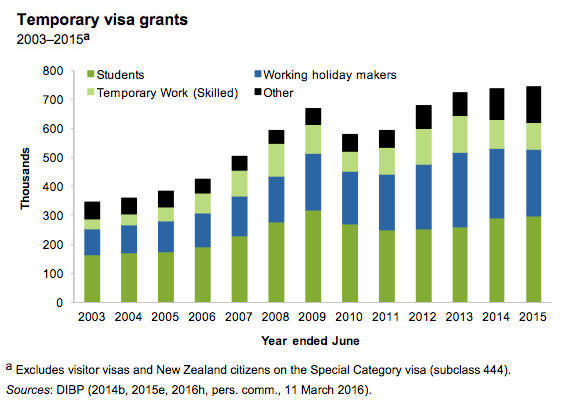
Temporary visa grants have doubled in a decade.
From temporary to permanent
The report describes how temporary migration has become "the dominate element of Australia’s immigration program”.
It argues this is problematic because this stream is "uncapped and allowed to fluctuate with the level of demand for individual visas".
The number of temporary migrants in Australia - mostly skilled 457 visa-holders, Kiwis, students and working holidaymakers - at any time is 10 times greater than the annual permanent migrant entry of approximately 190,000.
The report calls to review this dominance of temporary migrants and criticises management of the 457 program for relying on employers’ market testing that can be "as weak as an advertisement, of indeterminate length, on a social media platform”.
One in 10 complaints from the Fair Work Ombudsman were from temporary visa holders, the report notes, confirming problems exposed by high-profile exploitation cases such as the 7-Eleven under-payment scandal.

How migrants come to Australia.
A fair go for migrant workers
Associate Professor Joanna Howe from the law faculty at the University of Adelaide, who contributed to the report, notes that although we expect temporary migrant workers to have the same access to fairness and rights as Australian workers, “in practice we find a different story emerging”.
To address these problems, she wants to see the Migration Act amended to mandate that migrants workers are entitled to a fair go.
Cause for change
The earlier report raised the prospect of reducing the existing age limit of 50 years for permanent migrants under the skill stream.
This proposal was condemned by the Federation of Ethnic Communities’ Councils of Australia, which argued migrants in their 40s have a lot to offer Australia.
The Commission was also critical of current arrangements that allow family members of skilled migrants entry into Australia as “secondary” skilled migrants. It recommended skills of families be assessed as a whole.
The CEDA report did not address the age threshold or the merits of secondary migrants, but did echo the Productivity Commission in noting that the impact of temporary visa programs are poorly understood and these workers were often exploited.
Both called for a rebalance, or recalibration of the migrant intake.
Source: sbs.com.au
Apply Now
So that we may assess your eligibility for a Business Innovation and Investment Visa, please complete the following Assessment Form.
So that we may assess your eligibility for a General Skilled Migration, please complete the following Assessment Form.
Speak to our Consultants


Registered Migration Agent No. 9803463
Contact Details
Tel: +27 11 783 9440
Australian Mobile: +61 404 371 683
The Business Exchange
4th Floor, 96 Rivonia Road
Sandton
South Africa,
2057


